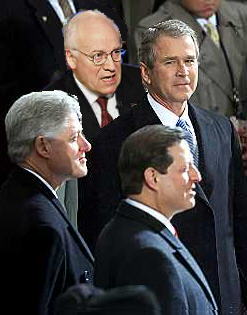
What follows is a more complete review of John Perkins’ Confessions of an Economic Hitman which I recently read on recommendation from a couple friends, and also a discussion of the linked issues of economic globalization and environmental conservation. As my previous blog entry summarized, Perkins’ book is an account of the life of an operative who worked for a private company from the 1960’s to 1980. He details the cynical escapades of the
Perkins opines that when simple extortion and bribery failed to convince democratically elected officials in
My take on this mind-set is that when one realizes (finally!) that the current gang in the White House is made up of corrupt scoundrels, the natural inclination is to throw one’s hands up in surrender and assume that no matter who is in the White House, no matter who we elect, such criminal activity will always be tolerated. Nothing could be further from the truth, but for a Bush voter, this is much easier to do than to admit that you simply voted for the wrong guy in 2000 and 2004.
I maintain that we in the
The discussion of the book devolved into a general discussion of the sustainability of the planet with the increasing use of natural resources and voracious appetite the
So let’s review a real economic plan for the 21st century that was put forth several years ago in a four-hundred page book which the author offered as just the “beginning of the conversation.” The author, I’ll call him Prince for now, outlined the extent of the problem and in the final chapters offered the Global Marshall Plan to ensure sustainability of the planet that included economic, political and technologic solutions. Prince’s five strategies included 1) stabilizing the world’s population, 2) developing environmentally appropriate technologies, especially in energy, agriculture and transportation, 3) formulating worldwide “rules of the road” to measure the economic and ecologic impact of our decisions, 4) negotiate worldwide regulations and enforcement mechanisms to ensure success of the overall plan, and 5) establish a worldwide cooperative to educate the world’s citizens about global environment. These strategies are expounded upon at moderate length as to how we can effect a positive change in “the social and political conditions most conducive to the emergence of sustainable societies.” The details of Prince's vision that connects the politics of global economy with planetary sustainability are too wonkish to pursue in this forum. The premise, written 14 years ago, emphasized the urgency of planning for the future before it’s too late.
Shortly after gaining power in 2001, our current Vice-President said, "Conservation may be a sign of personal virtue, but it is not a sufficient basis for a sound, comprehensive energy policy." Then he secretly met with energy company executives to formulate our "national" energy policy. Yeah, right. More recently we are learning that the Interior Department is superseding legislative fiat and giving private contracts for oil-drilling in the Alaskan reserve. Perkins mentions Cheney by name as one of the instigators of the “hitmen” who enslave the brown people throughout the world by extorting and threatening their leaders in order to extract oil, other natural resources and cheap labor from their countries. Not surprisingly, Prince’s plan does not call for extortion or bribery, but rather economic carrots and sticks as well as internationally determined regulatory structure to ensure population control, fair trade, fair wages and environmental sustainability.
The
The global environment is more than animals and rivers and streams; it also consists of 6 billion people and without proper regard for the lifestyle and well-being of the people or their economic development, then the planet is screwed. When Nike puts a factory in
A previous labor secretary, Robert Reich, outlined in his book The Future of Success, a framework whereby international trade would be governed by treaties that ensured that profits from such endeavors would instead be funneled back into the
Prince's and Reich's econnomic plans are based on moral and ethical principles that are as old as humankind itself. These principles are delineated in Native American practice, Socratic philosophy, Eastern religion and Christian faith; they're universal. Unfortunately, such ideas do not gain traction within our electorate because 1) it’s not in our immediate self-interest to care about brown-skinned people when we are getting cheap microwave ovens and TV’s, and 2) the “plantation owners” and slave-traders whip up the noise machine of pre-emptive war, blow jobs, weapons of mass destruction, fear of terrorism, and on and on and on in order to distract us from the necessary reforms which our leaders further claim are expensive and threaten our sovereignty. Reich's and Prince's enlightened ideas aren’t radical bleeding-heart liberal propositions that will drain our treasury and deplete our standard of living. (Wars do that.) These are moral and ethical principles that will ensure the health of our planet and everyone on it. Whether you're a Christian, atheist, Buddhist, or whatever, isn't that what morality is?
I realize that for a blog article this is becoming a lengthy thesis, so I’ll wrap it up. I would encourage anyone to read Prince’s book for an uplifting positive view of what our future can be. Is there a lot of work to do? Yes. But concrete ideas are out there that can be expanded and molded if we work for them. Is is possible? Only if we can reason with ourselves that our government is of, by and for us and not the plantation owners. We have an obligation to elect honest, intelligent visionaries and hold ourselves responsible to the entire planet. If you feel that none are available, then run for office yourself. Sitting in a basement, fearing terrorism, dream-catching and "discussing" Perkins’ book is not enough. Driving a four-cylinder car and eating sprouts is not enough.
I am not necessarily a religious man, but this situation reminds me of the old schoolyard jokes about St. Peter at the Pearly Gates greeting the newly deceased. When our planet is inundated with water from the melted ice caps,
Peter would reply, “God did not abandon you. He gave you Reason and Science to figure out solutions to your plight; instead you chose irrational belief and to live in fear rather than work for solutions. He gave you Love and Compassion to promote cooperation among all the people of the world; instead you gave power to the slave-traders who destroyed communities of your brothers and sisters throughout the world. He gave you Leaders with Vision to start you on the path of redeeming your planet. Instead you elected warmongers and ecological rapists whose short-sighted selfish financial interests destroyed your planetary home. You abandoned the gifts God gave to you. You abandoned God.” (You can substitute Earth Goddess, Krishna, Gaia or whatever your favorite flavor is for God. Personally, I'd pick simple Common Freakin' Sense!!, but that's me.)
Oh, I almost forgot… Prince’s book, written in 1992, is called Earth in the Balance.
And Prince? That was Senator, and later Vice-President, "Prince Albert" Gore.
We had our chance.

